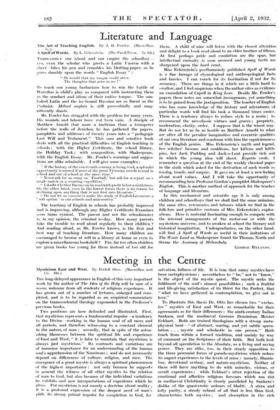Literature and Language
A Spell of Words. By L. Eekeustein. (The Peva Press. 7s. 8d.) TuaourGnotcr our island and our empire- the schoolboy— yes. even the scholar who greets a Latin Unseen with a cheer—bites his pen and crumbles his blotting-paper, as be gazes dumbly upon the words " English Essay " Al.° would that my tonglie could utter.
The thoughts that arise in sue !"
To teach our young barbarians how to win the battle of Waterlooi is child's play as compared with instructing them in the conduct and idiom of their native tongue.. The sun- baked Latin and the ice-hound Bit SSian are as fluent as the Psalmist. -.Milord a ',girds is still proverbially and mag- nificently dumb.
Mr. Fowler has struggled with the problem for massy years. his wounds and labour have trot been vain. A disciple of :Matthew Arnold (hut more a tactician than a -trumpeter before the walls of Jericho), he has gathered the papers, pamphlets and addresses of twenty years into a "pedagogic Last Will and Testament." This sane and sensitive book deals with all the practical (Edict:Ries of English teaching in schools : with the Higher ,Certificate, the school library, the Holiday Task ; with composition, with Shakespeare, With the English Essay. Mr.- Fowler's Warnings and sugges- tions are alike admirable. I will give some examples,: "lithe history of the nineteenth century is being read, a splendid .opPortsmity- is missed if none of the great 'Victorian novels is read in :sheet and out of school at the same time."
Never ask for an essay on ' Football;' but ask for a report. on single match or a scouting expedition."
1 doubt whether Bacon can be read with profit below a sixthforn n. On the other hand, es-on-in the lowest forms there is no reason for declining upon anything that is not first rate literature." , "Do not let us consentto make the study of English Literature a soft. option ' in our schools and universities." -
The teaching of English in schools has probably improved . and is improving, although any Higher Certificate Examiner
soon turns cynical. The parent and not the schoolmaster is, ilk my opinion, the criminal • to-day. How many parents take the trouble to read aloud regularly to their children ? And reading aloud, as Mr. Fowler knows, is the first and best way of teaching literature. How many children are encouraged to browse at will in a library at home or even to explore a miscellaneous bookshelf ? Far, far too often children are given books too young for them instead of too old for them. A child of nine will listen with the closest attention and delight to a book read aloud to an elder brother of fifteen. At first perhaps pride and emulation are the spur,, but intellectual curiosity .is soon aroused and young teeth are
sharpened upon the hard crust. -
Miss Eckenstein's posthumously published Spell of Words is a fine farrago of etymological and anthropological facts and fancies. I can vouch for its fascination if not for its accuracy. There are things in it Wilieh are a little hard to swallow, and I feel suspicious when the author cites as evidence an emendation of Capell in King Lear. Beside Mr. Fowler's papers these notes are somewhat incongruous, yet something is to be gained from the juxtaposition. The teacher of English who has some knowledge of the history and adventures of particular words will find his task a thousand times easier. There is a tendency always to reduce style to a norna recommend the neo-classic virtues and graces ; propriety, moderation, clarity; order. I suppose that is the wisest Way. But do not let us be as hostile as Matthew Arnold to what are after all the peculiar imaginative and eccentric qualities of our own literature and condemn with him the capriciousness of the English genius. • Miss Eckenstein's myth and legend, her witches' brooms and cauldrons, her kittens and kittic pins, her Jack Pudding and Jack-o-Lent provide richSoil in which the young idea will shoot. Experlo crede. remember a question at the end of the weekly classical paper in the sixth which asked for the derivation of such words as tozcdry, treacle, and umpire. It gave me at least a new feeling about word values. And I will take the opportunity of recommending here Professor Gordon's pamphlet Shakespeare's English. This is another method of approach for the teacher of language and literature.
In this mechanical anil scientific age it is only among children and schoolboys that we shall find the same animistit the same rites, ceremonies and tabooes which we find in the folk-lore and primitive customs of Miss Eckenstein's explor- ations. Here is material fascinating enough to compete with the internal arrangements of the motor-car or with, the mysterious universe, and to awaken at school the literary and historical imagination. Undergraduates, on the other hand. will find A Spell of Words as useful in their imitations of The Waste Land as Shakespeare found Sir Thomas North and Sterne the Anatomy of Melancholy.
GEORGE RYLANDE4.
































 Previous page
Previous page